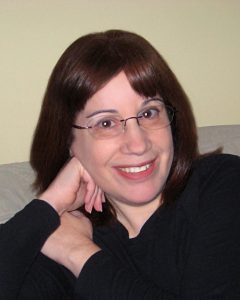 Barbara Shoup is the author of seven novels and the co-author of two books about the creative process. Her young adult novels, Wish You Were Here and Stranded in Harmony were selected as American Library Association Best Books for Young Adults. Vermeer’s Daughter was a School Library Journal Best Adult Book for Young Adults. She is the recipient of numerous grants from the Indiana Arts Council, two creative renewal grants from the Arts Council of Indianapolis, the 2006 PEN Phyllis Naylor Working Writer Fellowship, and the 2012 Eugene and Marilyn Glick Regional Indiana Author Award. Currently, she is the executive director of the Writers’ Center of Indiana. Her most recent novel is An American Tune.
Barbara Shoup is the author of seven novels and the co-author of two books about the creative process. Her young adult novels, Wish You Were Here and Stranded in Harmony were selected as American Library Association Best Books for Young Adults. Vermeer’s Daughter was a School Library Journal Best Adult Book for Young Adults. She is the recipient of numerous grants from the Indiana Arts Council, two creative renewal grants from the Arts Council of Indianapolis, the 2006 PEN Phyllis Naylor Working Writer Fellowship, and the 2012 Eugene and Marilyn Glick Regional Indiana Author Award. Currently, she is the executive director of the Writers’ Center of Indiana. Her most recent novel is An American Tune.
MWW social media intern Rachael Heffner interviewed Barb for this week’s E-pistle.
Rachael: Your intensive at MWW is called Writing YA: Think Like a Teenager. I know you don’t want to give too much away, but can you give one tip on how to “think like a teenager”?
Barbara: That teenage person is still there, inside every one of us. If you’re like me, you can’t help thinking like a teenager, at least some of the time. If you’ve forgotten how to think like a teenager, this workshop will take you right back to that time in your life and put you in touch with the emotional perspective you need to get a YA novel right.
Rachael: You write both YA and adult novels. What’s the biggest difference for you in terms of writing these types of books, or is there a difference?
Barbara: I don’t consciously choose to write one or the other. I write the novels that seem possible to write–some of them are made of ideas that reflect the complexity of adult life; others, the rawness and self-absorption of adolescence. They are equally interesting to me and equally challenging. In several cases, novels that started out as adult novels became YA novels in process when I realized that the strongest voices and most compelling stories were those of the younger characters.
Rachael: You are quite a busy woman. You are Executive Director at the Indiana Writers Center. You’ve just published a new novel called An American Tune. Most writers have to struggle to balance family, work, and writing. How do you do it?
Barbara: I’m extremely fortunate to love everything I do. Everything is of a piece to me and everything feeds my writing, one way or another. Still, it’s a constant struggle to keep everything in balance. Usually I write for a few hours early each morning. Sometimes I escape for a week or so to a quiet place and work nonstop, which is heaven. That said, there are plenty of times when I get overwhelmed and find my real life creeping into the time I need for fiction–which is not a good thing because when I don’t write, I’m just not okay. So I try to catch myself when I feel things getting out of whack. Years ago I read this in a women’s magazine–probably about dieting, but it seemed dead on in terms of everything: “Discipline is remembering what you want.” I want to be a writer, so I choose it whenever I can. Slowly, the pages pile up.
Barb’s Part II sessions (Friday and Saturday) include:
- The Particular Problems of Critiquing and Revising the Novel. Whether you work with a critique partner or regularly submit your novel to a workshop group, the process of critiquing a novel is completely different from critiquing a short story. Novels take a long time to write, they change as you write them, it’s hard to hold them in your head. And when you finally finish that first draft, how in the world are you supposed to look at it? This class will provide practical strategies for getting the useful insights from your readers, identifying problems in your novel, and creating a list of very specific issues you need to address to bring it closer to the novel you want it to be.
- Historical Fiction. Would you like to live in another time, by way of writing fiction? This class will provide an overview of the practical considerations of writing historical fiction, addressing such questions as: Where do you start? How do you keep your research from overwhelming the story? How true to the historical facts must you remain? How can you create characters true to the standards and knowledge of their time? And more.
- Publishing in a Brave New World Panel: Sarah LaPolla, Roxane Gay, Barb Shoup, Jane Friedman, D.E. Johnson



